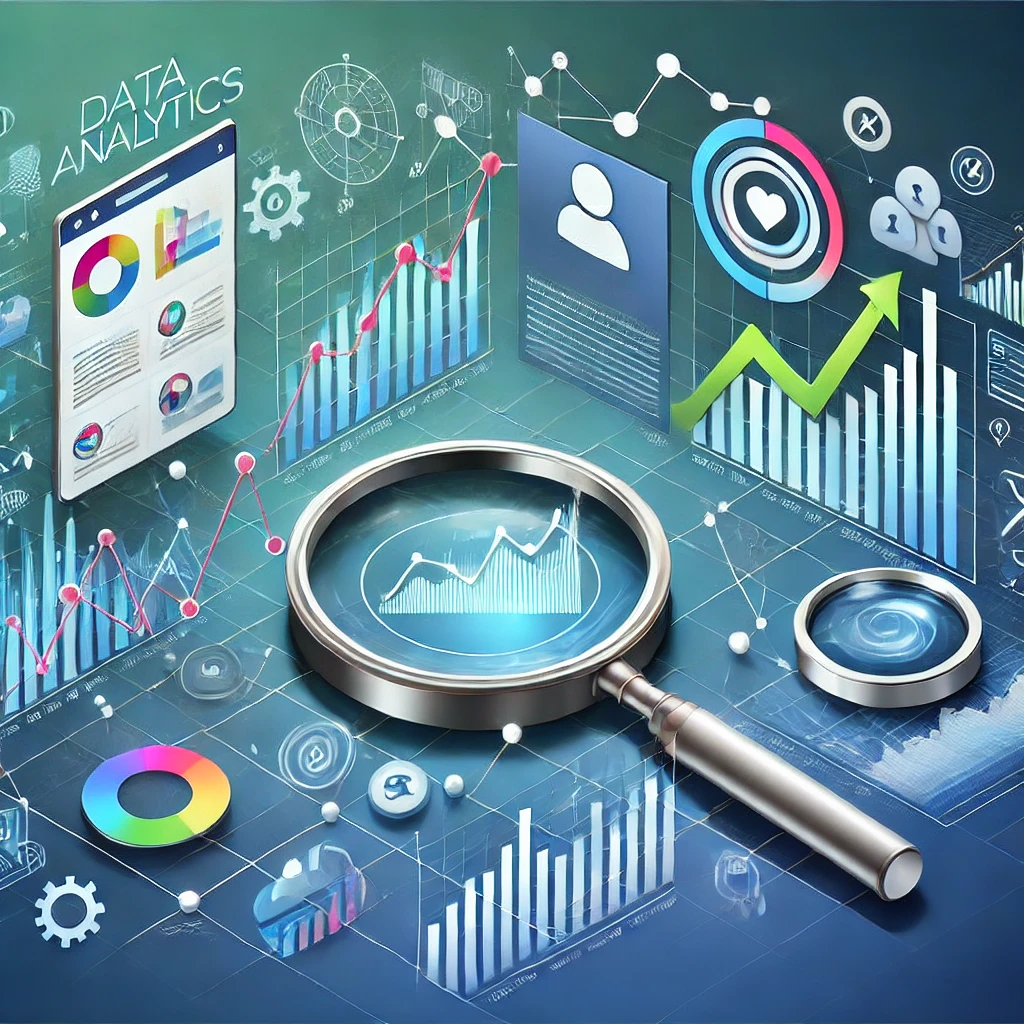.png)
Our customer support team is here to answer your questions. Ask us anything!
Chat with us on WhatsApp

Written By: Flipbz.org
In today’s digital age, data analytics has become a cornerstone for enhancing the performance of apps and websites. With millions of users interacting with digital platforms daily, businesses need insights derived from data to optimize user experiences, boost engagement, and increase profitability. By leveraging data analytics, companies can uncover valuable patterns, identify issues, and implement strategic improvements.
---
Data analytics involves collecting, processing, and interpreting information to guide decision-making. It provides actionable insights that help businesses improve their products and services.
Types of Data Analytics:
Descriptive: Provides historical data on what happened (e.g., number of website visitors last month).
Diagnostic: Explains why certain trends occurred (e.g., why user engagement dropped).
Predictive: Uses historical data to predict future trends (e.g., forecasting app usage spikes).
Prescriptive: Offers recommendations based on data (e.g., suggesting optimal website layouts).
Each type plays a crucial role in improving app and website performance.
---
Data analytics is essential for optimizing user experiences, which directly impacts performance metrics like engagement and retention.
Behavior Tracking: Analytics tools such as Google Analytics or Mixpanel allow businesses to track user behavior, such as navigation patterns and time spent on pages.
Heatmaps: These highlight areas on a website or app where users interact the most, helping identify popular features or overlooked sections.
A/B Testing: By testing different layouts, button placements, or color schemes, businesses can determine which versions yield better results.
For example, a streaming service might use heatmaps to discover that users struggle to find the "Search" feature, prompting a redesign to make it more prominent.
---
Analytics empowers businesses to identify performance bottlenecks and optimize functionalities.
Page Load Time: Slow-loading websites or apps often lead to user abandonment. Analytics tools like PageSpeed Insights help pinpoint areas for improvement.
Error Tracking: Tools such as Sentry or New Relic detect bugs and errors in real-time, enabling quicker resolutions.
Infrastructure Optimization: Analytics can reveal if a website or app requires more server capacity during peak usage.
By addressing technical issues promptly, businesses can ensure smoother user experiences.
---
Data analytics allows companies to deliver personalized experiences, a critical factor for retaining users in competitive markets.
Targeted Recommendations: Apps and websites like Amazon and Netflix use analytics to recommend products or content based on user preferences.
Dynamic Content: Platforms can adjust displayed content based on user demographics or location.
Behavior-Based Notifications: Analytics enable the sending of timely, relevant push notifications to re-engage users.
Personalization fosters a sense of connection between users and digital platforms, encouraging loyalty.
---
Data analytics provides insights into how users discover and interact with digital platforms, guiding marketing efforts.
Traffic Sources: Identifying whether users come from social media, search engines, or email campaigns helps businesses allocate resources effectively.
Conversion Rates: Analytics reveal which marketing channels drive the most sign-ups, purchases, or other desired actions.
Retention Metrics: Tracking user retention helps assess the success of campaigns and strategies.
For instance, an e-commerce site may discover that social media ads bring high traffic but low conversions, prompting them to refine their targeting.
---
Predictive analytics can forecast user behavior and market trends, helping businesses stay ahead of competitors.
Demand Forecasting: Predictive models can estimate future demand for products or features, enabling better resource planning.
Churn Prediction: By identifying patterns associated with user drop-offs, companies can take preemptive measures to retain users.
Trend Identification: Analytics can highlight emerging preferences, allowing businesses to innovate accordingly.
For example, a gaming app might use predictive analytics to anticipate peak playing times and optimize server capacity.
---
Analytics also plays a vital role in refining revenue-generation methods for apps and websites.
Ad Performance Tracking: Analytics tools measure the effectiveness of ads, identifying those that generate the most clicks or conversions.
In-App Purchases: Businesses can analyze purchasing behavior to introduce relevant promotions or features.
Subscription Models: Tracking user preferences helps optimize pricing and subscription offerings.
A subscription-based fitness app could use data to identify the most popular workout plans, creating premium versions to drive revenue.
---
Several analytics tools are available to help businesses improve their digital platforms:
Google Analytics: A comprehensive tool for tracking website traffic, user behavior, and marketing performance.
Firebase Analytics: Ideal for monitoring app performance and user engagement.
Hotjar: Provides heatmaps, session recordings, and user feedback tools.
Tableau: A powerful tool for visualizing and interpreting complex data.
Choosing the right tool depends on the platform's goals and needs.
---
While data analytics is powerful, businesses may face challenges:
Data Overload: Excessive data can be overwhelming. Focus on key performance indicators (KPIs) to avoid confusion.
Privacy Concerns: Collecting user data requires compliance with regulations like GDPR and CCPA.
Integration Issues: Implementing analytics tools may require technical expertise.
Addressing these challenges ensures businesses can fully leverage analytics.
---
The role of analytics in improving app and website performance will only grow with advancements in technology:
AI-Powered Insights: Artificial intelligence will enable deeper and faster analysis of complex data sets.
Real-Time Analytics: Businesses will increasingly rely on real-time data for instant decision-making.
Enhanced Personalization: Predictive models will drive even more personalized user experiences.
Embracing these innovations will keep businesses competitive in the ever-evolving digital landscape.
---
Data analytics is a transformative tool for improving app and website performance. By leveraging insights into user behavior, technical performance, and market trends, businesses can create optimized, engaging, and profitable digital platforms. Incorporating analytics into your operations not only enhances your current offerings but also ensures long-term success in the dynamic digital world.
Please register to comment.
With these components in place, your business...
Here is an opportunity to buy an established...
Discover promising partnership opportunities in various industries.
Pitch Your Startup | Find Partners
Comments